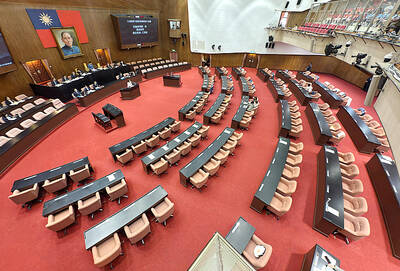Australian Prime Minister Anthony Albanese has become the country’s first prime minister to win a second consecutive three-year term in 21 years.
“Thank you to the people of Australia for the chance to continue to serve the best nation on Earth,” Albanese told a jubilant crowd at a campaign party in Sydney.
He vowed to steer the nation through a rough patch of global uncertainty.

Photo: AFP
Opposition leader Peter Dutton conceded defeat in yesterday’s election, saying: “We didn’t do well enough during this campaign, that much is obvious tonight, and I accept full responsibility for that.”
“Earlier on, I called the prime minister to congratulate him on his success tonight. It’s an historic occasion for the Labor Party and we recognize that,” he added.
The Australian Electoral Commission’s projections at press time gave Albanese’s ruling center-left Labor Party 70 seats and the conservative opposition coalition 24 seats in the 150-seat Australian House of Representatives, the lower chamber where parties need a majority to form governments. Unaligned minor parties and independent candidates appeared likely to win 13 seats.
Australian Broadcasting Corp election analyst Antony Green predicted Labor would win 76 seats, the coalition 36 and unaligned lawmakers 13.
Labor would form a majority or minority government, and the coalition had no hope of forming even a minority government, Green said.
The election is taking place against a backdrop of what both sides of politics describe as a cost of living crisis.
It was also the first election in Australia in which Baby Boomers, born between born between the end of World War II and 1964, are outnumbered by younger voters. Both campaigns had promised policies to help first-home buyers buy into a property market that is too expensive for many.

CROSS-STRAIT COLLABORATION: The new KMT chairwoman expressed interest in meeting the Chinese president from the start, but she’ll have to pay to get in Beijing allegedly agreed to let Chinese Nationalist Party (KMT) Chairwoman Cheng Li-wun (鄭麗文) meet with Chinese President Xi Jinping (習近平) around the Lunar New Year holiday next year on three conditions, including that the KMT block Taiwan’s arms purchases, a source said yesterday. Cheng has expressed interest in meeting Xi since she won the KMT’s chairmanship election in October. A source, speaking on condition of anonymity, said a consensus on a meeting was allegedly reached after two KMT vice chairmen visited China’s Taiwan Affairs Office Director Song Tao (宋濤) in China last month. Beijing allegedly gave the KMT three conditions it had to

‘BALANCE OF POWER’: Hegseth said that the US did not want to ‘strangle’ China, but to ensure that none of Washington’s allies would be vulnerable to military aggression Washington has no intention of changing the “status quo” in the Taiwan Strait, US Secretary of Defense Pete Hegseth said on Saturday, adding that one of the US military’s main priorities is to deter China “through strength, not through confrontation.” Speaking at the annual Reagan National Defense Forum in Simi Valley, California, Hegseth outlined the US Department of Defense’s priorities under US President Donald Trump. “First, defending the US homeland and our hemisphere. Second, deterring China through strength, not confrontation. Third, increased burden sharing for us, allies and partners. And fourth, supercharging the US defense industrial base,” he said. US-China relations under

The Chien Feng IV (勁蜂, Mighty Hornet) loitering munition is on track to enter flight tests next month in connection with potential adoption by Taiwanese and US armed forces, a government source said yesterday. The kamikaze drone, which boasts a range of 1,000km, debuted at the Taipei Aerospace and Defense Technology Exhibition in September, the official said on condition of anonymity. The Chungshan Institute of Science and Technology and US-based Kratos Defense jointly developed the platform by leveraging the engine and airframe of the latter’s MQM-178 Firejet target drone, they said. The uncrewed aerial vehicle is designed to utilize an artificial intelligence computer

The Chinese Nationalist Party (KMT) caucus yesterday decided to shelve proposed legislation that would give elected officials full control over their stipends, saying it would wait for a consensus to be reached before acting. KMT Legislator Chen Yu-jen (陳玉珍) last week proposed amendments to the Organic Act of the Legislative Yuan (立法院組織法) and the Regulations on Allowances for Elected Representatives and Subsidies for Village Chiefs (地方民意代表費用支給及村里長事務補助費補助條例), which would give legislators and councilors the freedom to use their allowances without providing invoices for reimbursement. The proposal immediately drew criticism, amid reports that several legislators face possible charges of embezzling fees intended to pay